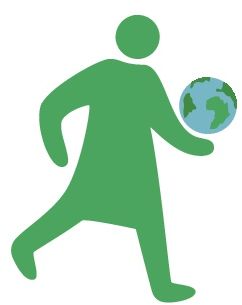 We’d like to share with you what has recently been shaping our thinking about climate justice, carbon reduction and our role in caring for our environment. In a climate of pain, uncertainty, deepening inequalities and environmental crisis, we have been turning to feminist leadership and solutions to look to the future and imagine a radically different world.
We’d like to share with you what has recently been shaping our thinking about climate justice, carbon reduction and our role in caring for our environment. In a climate of pain, uncertainty, deepening inequalities and environmental crisis, we have been turning to feminist leadership and solutions to look to the future and imagine a radically different world.
Something to read…
In these shifting, changing, difficult times, we found hope in this article by Rebecca Solnit.
“The last four years have been a long, rough road for people who care about the fate of the earth and the rights of ordinary people, and I understand the temptation to feel that what is wrong now will be wrong forever, to feel that it is too much to face and more than we can change. But anguish and hope – hope as ferocious will to continue, and not to trust the odds but to change them – can coexist.”
https://www.theguardian.com/commentisfree/2020/sep/19/covid-climate-change-
Something to watch…
We’re huge fans of Vandana Shiva at GWL and you can find out more about the trailblazing eco-activist in these videos.
Dr. Vandana Shiva is a philosopher, environmental activist, author and eco feminist. Born in 1952 she grew up in Himalayan forest in Dehradun, India. One aspect of her wide-reaching work is with the non-governmental organisation Navdanya (‘Nine Seeds’ or ‘Nine Gifts’), which emerged from a research intiative she founded. Navdanya has helped establish a network of over 100 community seed banks in 17 states of India, organised training, and at the ‘biodiversity- intense’ farm in Dehradun, conserves indigenous varieties of plants for food and medicine. You can find out more about her wide-reaching, phenomenal work in our book collection!
http://vandanashivamovie.com/videos/
Something to listen to…
Rachel Carson was a writer, biologist, ecologist and her legacy is still being felt today. Her sensational book Silent Spring (1962) warned of the dangers to all natural systems from the misuse of chemical pesticides such as DDT, and questioned the scope and direction of modern science, initiated the contemporary environmental movement.
In this podcast, fifty years after the book’s publication, Franny Armstrong, director of the film ‘Age of Stupid’ and founder of the 10:10 Climate Change campaign, looks at the far-reaching influence of Carson’s book, “Silent Spring”. She talks to Caroline Lucas about the impact Silent Spring had when it was first published, the challenges she faced, and how she made her case so effectively.
https://www.bbc.co.uk/programmes/b01ptgb4
We’ve also been listening to plenty of Mothers of Invention podcasts – they’re all fantastic, but we’d especially recommend this one right now: We Are Really Big Huggers. This is the first episode of 2020, and it unpacks what compassion in women’s leadership has shown the world during the Covid-19 crisis; looks at the Black Lives Matter uprising and the lessons in accountability and self-care it has addressed; and imagines a new regenerative future that includes us all. Speakers include Daiara Tukano, who is from a Northern Amazon indigenous community in Brazil, and co-executive director of the Green New Deal UK, Fatima-Zahra Ibrahim.
https://www.mothersofinvention.online/s3ep1
You can see previous Green Learning here.
Let us know if there is anything you think we should be reading, watching or listening to. We’d love to hear your recommendations!
Our GWL and Climate Change Survey…
If you follow GWL online or have visited our building you’ll know that we have been thinking about how we live in and care for our shared environment both locally and globally. We’d like to invite your thoughts and feelings, in this moment of significant change, on how we create more sustainable and just futures for everyone. If you can take a moment to complete this brief survey, we would really appreciate hearing your responses. You can find the questions by following this link: https://forms.gle/fya2zLHwRDpcM8jk6
The answers from this survey will guide what we do next to reduce our impact on the environment and support our audiences to be part of the solutions to climate change. Thank you for taking part.

Comments are closed.